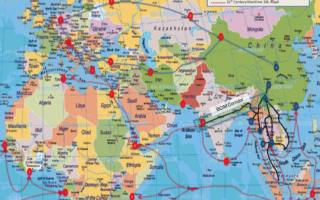Owning the niche China – Africa Belt and Road?
For bloggers, agents, collaborators about China – Africa Shipping Business.
Manage any Chinese - African niche to dominate them virtually in order to make money together with us
For example, Beijing - Nigeria SHipping Business, Guangdong – Ethiopia delivering, China – South Africa Belt and Road, Tanzania – Shanghai transpot 4.0, China – Angola new routes….Etc etc,
Good ideas about coordinated transport or coordinated global routes in China – Africa?
Any Project for your African country in mind?
Your ideas means money in Sylodium.
contacts us here info@sylodium.com
For companies and institutions in China - Africa or Latam - Africa.
Our logical business system, allows you to segment your target markets to be seen, and dominate the bilateral trade niches you choose www.ChinaAfrica.mobi or www.EUAfrica.mobi etc, are just the domains as starting point towards a comprehensive system where, URLs, metas and contents are ordered in the real an unique (correct) way to be the real (unique) business platform that represent the reality of international business in Internet.
China’s Belt and Road, and Africa’s industrialized
New from NewEra.com.na
Kenyan scholar claims, the 21st Maritime Silk Road envisioned by Chinese leaders will not only foster Sino-Africa bilateral trade, but also fuel industrialization in the world’s second largest continent of Africa. Peter Kagwanja, the CEO of the Nairobi-based Pan African think-tank Africa Policy Institute, said China’s Silk Road would herald prosperity and renewal in Sub-Saharan Africa and will spur socio-economic benefits in Africa.
The former is known as the Silk Road Economic Belt from China to Rotterdam and Hamburg, which will change global economics. The second section ― the 21st Century Maritime Silk Road ― is a series of linked shipping lanes from China to Piraeus in Greece to Africa. Belt and Road Initiative involve 65 countries and impact about 60 percent of the world’s population, an unprecedented project of international interactions.
For Africa, Belt and Road Initiative isn’t only a better connection to the Chinese market, but also to European and Middle Eastern markets closer by. This, together with the promise of Chinese-funded infrastructure, has made Africans beneficiaries of the initiative.
Along this Silk Road, seven ports are located on Africa’s coastlines. They are in Djibouti, Tanzania, Mozambique, Gabon, Ghana, Senegal, Tunisia, circling the whole continent of Africa. The Strategic Maritime Distribution Centers (SMDC) are located close to large population centers with reliable road systems for distribution to local and regional markets. For example, the Libreville port in Gabon, Africa’s 4thmost developed country with a per capita GDP of more than 11,000 USD, will serve as a distribution center to neighboring Cameroon, the Congo, and Nigeria to the north.
According to the Chinese government’s official plans, Belt and Road Initiative has two African hubs: Kenya and Egypt. But Chinese-funded rail and communication networks are also linking other East African countries like Ethiopia, Tanzania and Rwanda to the BRI route.

While East Africa, where much of China’s direct influence is, makes up the southernmost corner of Belt and Road Initiative and only represents a small fraction of the whole scheme, the initiative has massive implications for the continent as a whole. This is because Belt and Road Initiative doesn’t only touch Kenya’s eastern seaboard, it links with internal infrastructure networks also financed by China as well.
The combination of port and anti-piracy expansion will surely smooth long-distance trade with China, while facilitating African trade via closer Belt and Road Initiative hubs.
Some East African governments see the influx of Chinese investment in infrastructure and manufacturing as a way to bridge infrastructure gaps and to position their countries as new logistics and manufacturing hubs that could serve not only Africa, but also the Middle East and Europe, thus speeding up Africa’s industrialization.
China - Africa 4.0 - 27/01/2019
China - Africa 4.0 - 11/09/2018

